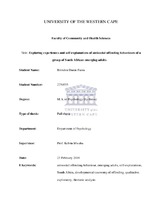| dc.contributor.advisor | Mwaba, Kelvin | |
| dc.contributor.author | Faroa, Brendon Duran | |
| dc.date.accessioned | 2018-08-07T11:48:31Z | |
| dc.date.available | 2018-08-07T11:48:31Z | |
| dc.date.issued | 2018 | |
| dc.identifier.uri | http://hdl.handle.net/11394/6215 | |
| dc.description | Magister Artium - MA (Psychology) | |
| dc.description.abstract | Antisocial offending behaviour relate to instances of criminal and societal norm violating behaviour. In South
Africa, statistics on antisocial offending behaviour reflect high incidence rates among South African young
people who engage in societal norm violations that are largely aggressive and criminal in nature. In the
country's prisons, the average inmate is a young substance abuser who is unemployed, has dropped out of
school before high school, is functionally illiterate and, more often than not, homeless. This is particularly true
for emerging adults (those between the ages of 18 and 25 years) who constitute the poorest economic age
group, the average house burglar as well as make up more than a quarter of the prison population in South
Africa. In South Africa as well as internationally, the antisocial offending behaviour of emerging adults
remain grossly understudied especially through qualitative self-explanations. The present study utilised a
qualitative research approach to explore experiences and self-explanations regarding antisocial offending
behaviours of a group of 10 South African emerging adults. The study used an exploratory research design.
Participants were drawn from a number of non- government organisations, and two townships in Cape Town
which is located in the Western Cape Province of the Republic of South Africa. | |
| dc.language.iso | en | |
| dc.publisher | University of the Western Cape | |
| dc.subject | Antisocial offending behaviour | |
| dc.subject | Emerging adults | |
| dc.subject | Self-explanations | |
| dc.subject | South Africa | |
| dc.subject | Developmental taxonomy of offending | |
| dc.subject | Qualitative | |
| dc.subject | Exploratory | |
| dc.subject | Thematic analysis | |
| dc.title | Exploring experiences and self-explanations of antisocial offending behaviours of a group of South African emerging adults | |
| dc.rights.holder | University of the Western Cape | |

